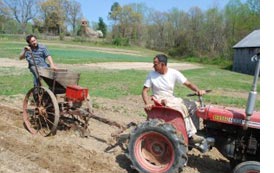 Many small family farms switch into gear in late winter and early spring to get the farm season on track. On our farm we are busy ordering seeds, building new hoop houses, fixing fences, tuning up tractors, signing up our CSA customers, and dreaming of a great season. Soon we will have tens of thousands of seeds to plant in trays in the hoop house. Spring season is a super-busy time for farmers and this year we need to add something big to our ever-growing to-do lists: influencing national policy.
Many small family farms switch into gear in late winter and early spring to get the farm season on track. On our farm we are busy ordering seeds, building new hoop houses, fixing fences, tuning up tractors, signing up our CSA customers, and dreaming of a great season. Soon we will have tens of thousands of seeds to plant in trays in the hoop house. Spring season is a super-busy time for farmers and this year we need to add something big to our ever-growing to-do lists: influencing national policy.
My husband and I started our farm, Jug Bay Market Garden, 10 years ago because we wanted to promote meaningful alternatives to industrial agriculture. We grow a mix of vegetables, flowers, and herbs on our farm and in various fields that we borrow from neighbors. We now market primarily through a CSA that we deliver to the Capitol Hill neighborhood of Washington, DC.
I used to argue that farmers cannot be expected to be activists, too. We are just way too busy and already playing a role. Isn’t it enough to demonstrate alternatives to the industrial food system by running organic and sustainable farms? Can’t we leave the activism in the hands of our friends who have regular 9-to-5 jobs and are not too exhausted to form a sentence when their workday is done? But recent events in Washington have demonstrated that it is in everyone’s best interest for us to be advocates, too.
At the very end of 2012, in the midst of fiscal cliff madness, Congress passed a controversial farm bill extension. Maybe you saw headlines like this one from the Argus Leader: “Organic ag feels neglect in the farm bill: Passed over in favor of large commodity farmers.” Despite great work by advocates for organic and sustainable farming, the extension of the farm bill contained many disappointments.
According to Brian Snyder, the executive director of the Pennsylvania Association for Sustainable Agriculture, the last-minute extension of the farm bill was a wakeup call. “While retaining the subsidy programs for commodity crops, essentially all of the more-or-less sustainable provisions of the bill were missing in the extension.” Similarly, Roger Noonan, president of the New England Farmers Union, said, “This extension is a disaster for New England farmers and consumers. Programs that support renewable energy, farmers markets, beginning farmers, organic and specialty crop research were all stripped of mandatory funding for 2013.”

Also left out was the very important organic cost-share, which helps offset the cost of organic certification by reimbursing the small farmers all or part of the certification fee. On our farm, we haven’t certified organic for a few years because we were too overextended to take on the paperwork. But in 2013 I was determined to recertify so we could market to local stores like MOM’s Organic Market. Due to our smaller size, the full $500 cost is economically unfeasible. I am sure many other small organic farmers will decide against certification this year for the same reason. Likewise, without funding for farm research to help organic farmers adapt to changing conditions like new weeds, pests, and climate change, we will all suffer.
On the bright side, work is already underway for a new farm bill. Senator Debbie Stabenow, D-MI, chairwoman of the Senate Agriculture Committee, is already talking about retooling the farm bill. We have a chance to get involved and have already seen what will happen if we don’t; a bill devoid of meaningful help for the small farmers who need it most.
Perhaps these challenges will motivate sustainable and organic farmers across the country to build stronger and more powerful grassroots organizations. Many organizations already exist and are doing phenomenal work. We should support efforts of our local and regional organizations like PASA and national organizations like the National Organic Coalition, the National Sustainable Agriculture Coalition, the National Young Farmers Coalition, and the National Farmers Union. We need these organizations and more farmer-driven organizations that understand the particular needs of small family farms and organic farms. Farmers should encourage our CSA members, our customer base, religious groups, and other allies to join us in the effort.
This has been a true wakeup call. There is so much good news coming from the growing food movement. Despite hopeful and meaningful signs that the public stands behind local farms, there is still so much work to be done. We can’t rest until national legislation reflects public opinion and supports local farms. Now is the time for farmers and consumers who care about access to local fresh and organic food to send a clear message to Washington.
We need legislation that supports sustainable and organic farms if we want access to delicious local foods. These movements have come so far and we’ve already done the hard work of building broad nationwide public support for farmers. Now we need to take delivery by strengthening our organizations and winning new policies from Washington to match public opinion.
Courtesy of Food Politic, Journal of Food News and Culture
________________________
Tanya Tolchin grows vegetables and flowers on her family farm in Maryland just 20 miles from Washington, DC. She is a manager of Israeli Harvest, a small business that supports farmers in Israel by selling organic olive oil and dates in the U.S. She writes about farming, parenting, and Jewish life on her blog, On the Lettuce Edge, and elsewhere. Her writings have appeared in the Jewish Daily Forward, Kveller, the Washington Jewish Week, and a new book about first-generation farmers called “Greenhorns: 50 Dispatches from the New Farm Movement,” from Storey Press. Prior to farming, she worked for the Sierra Club in Washington, DC for 10 years on efforts to help protect national forests and build new strategic partnerships.
Join the Chief Banana newsletter for weekly fruit facts, workplace wellness ideas, and occasional offers.
"*" indicates required fields
By signing up, you agree to receive emails from The FruitGuys. You can unsubscribe anytime.
Keep exploring.
Browse by theme.
Get easy recurring deliveries for break rooms, micro markets, and more.
Take advantage of faster checkouts and other great benefits.
Create an AccountWe are here to help you provide healthy food, meaning, and a reason to gather in your workplace.
From weekly mixed fruit for break rooms to monthly gifts for remote staff to special projects, we can serve your needs or turn your dreams into a nourishing reality.
Get fruit news, snack tips, and office wellness insights in your inbox each week, fresh from the desk of our CEO (aka Chief Banana)!
"*" indicates required fields

